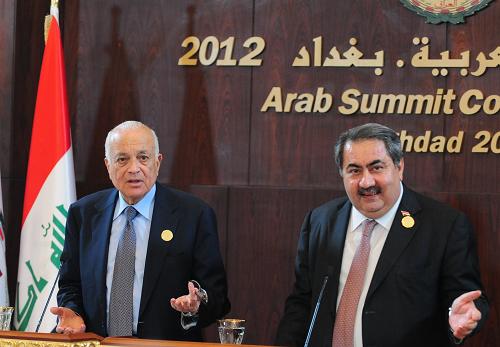AL backs Annan's Syria plan at Baghdad summit
The Arab leaders ended Thursday the Arab League (AL) summit in Baghdad after approving the final statement and a document named Baghdad declaration.
The AL Secretary General Nabil al-Arabi and Iraq's Foreign Minister Hoshyar Zebari, announced in a joint press conference that the closing session of Baghdad summit ended with approving the final statement of the summit and the Baghdad declaration.
Both the final statement and the declaration were not announced live, but the media got them after being distributed following the session.
"Baghdad summit has succeeded and that was also said by the delegations and leaders of the Arab and international countries," Zebari told reporters after the summit.
The final statement of the summit included the call from Arab leaders on "the Syrian government to immediately stop violence, murder, and to protect civilians and to ensure the freedom of peaceful protests."
They also called on the "Syrian forces to withdraw from the cities and villages, and to safeguard Syria's stability, and reject any military intervention.
The leaders called for providing full support to the mission of the UN envoy Kofi Annan.
"The Arab leaders condemned violations of human rights and considered the massacre of Baba Amr (in Homs in central Syria) by the Syrian security and army forces a crime against humanity that entails bringing the Syrian officials to justice."
They called on the Syrian opposition to close ranks and prepare to start serious dialogue that would lead to democracy, the statement said.
As for Palestine, the Arab leaders confirmed that the "fair and comprehensive peace in the region would not be achieved without full withdrawal by Israel from the occupied Palestinian and other Arab lands to the border line of June 4, 1967."
They also support the Palestinian demand to the United Nations to recognize the state of Palestine on the June 4, 1967 border line, and to recognize the eastern Quds as the capital of the new state that would enjoy a full membership in the UN.
Meanwhile, the Arab leaders "renew their stance to condemn all kinds of terrorism and to eradicate its ideological and monitory resources."
However, they called to distinguish between terrorism and legal resistance against occupation.
The Arab leaders also stress on their keenness to give a success to the efforts of freeing the Middle East of nuclear weapons and other weapons of mass destruction.
As for the Baghdad declaration, which is a document prepared by the Iraqi government and approved by the Arab leaders, the declaration included the adoption of a comprehensive vision for political reform, economic and social order to maintain the dignity of the Arab citizen and promote their civil rights.
They (Arab leaders) stress their full support for the aspirations and the legitimate demands of the Syrian people to freedom and democracy and to ensure their right to draw their own future, through peaceful transfer of power.
They condemned the acts of violence and adhere to a political solution and national dialogue away from foreign intervention in the Syrian crisis in order to preserve the unity of Syria.
They called for talks between the Syrian government and the opposition based on Annan's six-point peace plan, which should be implemented fully and immediately.
Iraq sees the summit as a significant milestone in its history that would lead the country to play a powerful and positive role in the Arab world.


